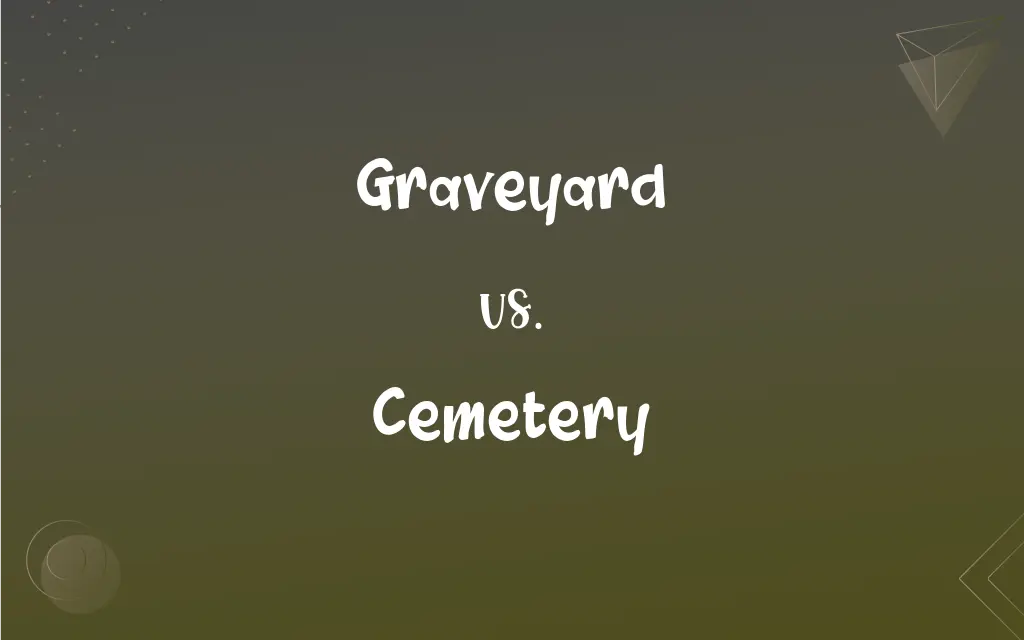Graveyard vs. Cemetery: What's the Difference?
Edited by Janet White || By Harlon Moss || Updated on October 9, 2023
Graveyards are burial grounds attached to churches, while cemeteries are standalone burial places and may not be affiliated with a church.

Key Differences
A graveyard typically denotes a burial place that is directly attached or adjacent to a church. Conversely, a cemetery signifies a larger burial ground that may not necessarily be associated with a church and can be independently standing. The distinction between a graveyard and a cemetery primarily lies in their proximity and affiliation with a church facility.
Historically, graveyards have been intimate spaces, often emanating a sense of locality and community. Cemetery spaces, however, have often been devised with a broader appeal, serving larger communities or even entire cities, thereby having a more extensive and diverse demographic representation. The historical context provides a nuanced lens through which to view graveyards and cemeteries, considering their socio-cultural implications.
Aesthetically, graveyards often convey a more compact and older feel, reflective of their close-knit community associations and historical bearings. On the other hand, cemeteries might exhibit a broader range of architectural and design diversities, sometimes encompassing different burial practices and traditions, and often reflecting a wider socio-cultural spectrum.
From a cultural and ritualistic standpoint, graveyards often exude a more localized and traditional aura, while cemeteries might cater to diverse customs and practices due to their more inclusive nature. Graveyards can be seen as embodying more homogeneity in burial practices, whereas cemeteries may encompass a variety of rituals and memorials.
Comparison Chart
Affiliation with Church
Usually affiliated and adjacent to a church.
May or may not be affiliated with a church.
ADVERTISEMENT
Size and Scale
Generally smaller in size.
Often larger, catering to wider communities.
Historical Aspect
Often older, with historical connotations.
Can be newer, with diverse historical aspects.
Aesthetic & Design
Tends to be more traditional and compact.
May present a wide range of designs and spaces.
Cultural Representation
Likely to showcase local, unified cultural practices.
May exhibit a variety of cultural practices and memorials.
Graveyard and Cemetery Definitions
Graveyard
A graveyard often reflects local cultural and community ties.
The graveyard was adorned with flowers during the annual remembrance event.
ADVERTISEMENT
Cemetery
A cemetery is an extensive burial ground, not necessarily adjacent to a church.
The city planned to build a new cemetery to accommodate its growing population.
Graveyard
A graveyard may hold historical significance and memorialize local individuals.
The revolutionary soldiers were buried in a local graveyard.
Cemetery
A cemetery might contain spaces for different religious and cultural practices.
The cemetery had sections allocated for various religious burial customs.
Graveyard
A graveyard signifies a consecrated area for the burial of the deceased.
Ghost stories often feature a spooky graveyard setting.
Cemetery
A cemetery may include diverse burial practices and multiple memorial types.
The cemetery included a section for cremation urns.
Graveyard
A graveyard might exhibit older burial practices and monuments.
The headstones in the graveyard dated back to the early 1800s.
Cemetery
A cemetery can be public or private, offering various memorial services.
The private cemetery offered exclusive burial plots and memorial services.
Graveyard
A graveyard is a small burial area, typically adjoining a church.
The ancient graveyard behind the chapel was serene and peaceful.
Cemetery
A cemetery often serves larger communities or multiple communities.
The regional cemetery was shared among three neighboring towns.
Cemetery
A place for burying the dead; a graveyard.
Cemetery
A place where the dead are buried; a graveyard or memorial park.
Cemetery
A place or ground set apart for the burial of the dead; a graveyard; a churchyard; a necropolis.
Cemetery
A tract of land used for burials
FAQs
What defines a graveyard?
A graveyard is typically a burial site attached to a church, often smaller and locally oriented.
What is a cemetery?
A cemetery is a burial ground that may or may not be affiliated with a church, often serving a larger community.
Is a cemetery always larger than a graveyard?
Generally, yes. Cemeteries often cater to larger populations and therefore are typically larger than graveyards.
Are there differences in burial practices in graveyards and cemeteries?
Graveyards might have more homogenous practices due to local ties, while cemeteries might exhibit a range of practices due to serving diverse communities.
Do graveyards and cemeteries have different legal statuses?
It can depend on local laws, but generally, they may have different regulations due to their size and affiliation.
Can a person of any faith be buried in a graveyard?
It might depend on the graveyard’s affiliation and local practices. Some might be exclusive to a particular faith or community.
Why do some people prefer burial in a graveyard?
People might prefer graveyards for their historical, community, or religious affiliations.
Can any religion bury their dead in a cemetery?
Typically, cemeteries cater to various religions and beliefs, but specific sections might be designated for different practices.
Can I pre-purchase a burial plot in both graveyard and cemetery?
Yes, typically plots can be pre-purchased in both, subject to availability and local regulations.
How is the maintenance of graveyards and cemeteries managed?
Maintenance might be handled by church authorities for graveyards and municipal bodies or private entities for cemeteries.
Why might a graveyard be preferred for historical preservation?
Graveyards often contain older burials and might be of historical significance, warranting preservation.
Can a graveyard exist without a church?
Traditionally, graveyards are associated with and are adjacent to churches.
Can a graveyard evolve into a cemetery?
Yes, a graveyard might evolve into a cemetery, especially if it expands and becomes unaffiliated with a church.
Can a cemetery be non-religious?
Yes, cemeteries can cater to various beliefs, including non-religious or secular practices.
Why might some graveyards no longer be in use?
Over time, graveyards may become full, or communities may move, leading to discontinued use.
Are cemeteries always open to the public?
While many cemeteries are open to the public, private cemeteries might restrict access.
What kinds of memorials might be found in a cemetery versus a graveyard?
Cemeteries might offer a wide variety of memorials and burial styles, while graveyards might have more traditional and homogenous memorials.
How does a graveyard play a role in community identity?
Graveyards, often being older and community-centric, can become markers of local history and identity, embodying shared experiences and ancestors.
How do graveyards and cemeteries differ in cultural significance?
Graveyards often hold local cultural significance, while cemeteries may encompass broader, diverse cultural representations.
Can a cemetery belong to a church?
Yes, a cemetery can be affiliated with a church, although it's not a defining characteristic like a graveyard.
About Author
Written by
Harlon MossHarlon is a seasoned quality moderator and accomplished content writer for Difference Wiki. An alumnus of the prestigious University of California, he earned his degree in Computer Science. Leveraging his academic background, Harlon brings a meticulous and informed perspective to his work, ensuring content accuracy and excellence.
Edited by
Janet WhiteJanet White has been an esteemed writer and blogger for Difference Wiki. Holding a Master's degree in Science and Medical Journalism from the prestigious Boston University, she has consistently demonstrated her expertise and passion for her field. When she's not immersed in her work, Janet relishes her time exercising, delving into a good book, and cherishing moments with friends and family.
































































